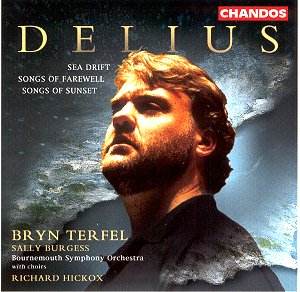No conductor of recent times has carried the flag for British
music with as much purpose as Richard Hickox. This Chandos reissue of
his hugely successful recording of Delius orchestral-choral works made
a strong impression when it appeared in the early 1990s, and its return
nearly ten years later is no less welcome. In fact the received critical
opinion placed these performances as 'the best since Beecham': high praise
indeed for a disc which also won a Gramophone Award.
Listening to the disc again, it is not hard to understand
the enthusiasm. Hickox has a real feeling for this repertoire, and his
phrasing is lovingly shaped. For example, the opening bars of Sea
Drift are quite beautifully expressed, with excellent playing from
the Bournemouth Symphony Orchestra. Like the other British regional
orchestras, the BSO is best described as an international orchestra
which happens to be based in the regions.
All this is enhanced by the sympathetic Chandos sound,
so that the climactic moments emerge naturally from the ebb and flow
of the musical line. Since the Delius style is subtle and deliberately
avoids established formulae, this feature is particularly important.
As we have come to expect, Bryn Terfel is in glorious voice, and the
solo part in Sea Drift suits him admirably. My only complaint,
if complaint it is, concerns the lack of separate cue points in Sea
Drift (they are there in the other pieces). Admittedly Sea Drift
is composed in one unbroken span of 25 minutes, but it does move
through various phases and the option of finding the various sections
more easily might have been helpful.
In the Songs of Sunset Sally Burgess makes an
excellent companion soloist to Terfel, although the pair of them are
placed too far forward in the sound perspective. This approach simply
does not suit the nature of the music. But here and in the Songs
of Farewell the choral singing is admirable, and offers ample subtlety
and beauty of tone.
Andrew Burn, in his perceptive accompanying essay,
explains that Delius defined form as the 'imparting of spiritual unity
to one's thought', and that quotation captures the essence of both the
Songs of Sunset and Songs of Farewell. Indeed the very
titles of these pieces express the special late-romantic yearning which
is their spiritual and expressive priority.
The Songs of Farewell were among the compositions
which were completed around 1930 by the blind and ailing Delius with
the help of his amanuensis Eric Fenby, and Burn rightly claims them
to be the finest fruit of this collaboration. How fitting then that
the final passionate climax should subside to an ending in which the
imagery is the peaceful evocation of the departing soul.
Terry Barfoot

